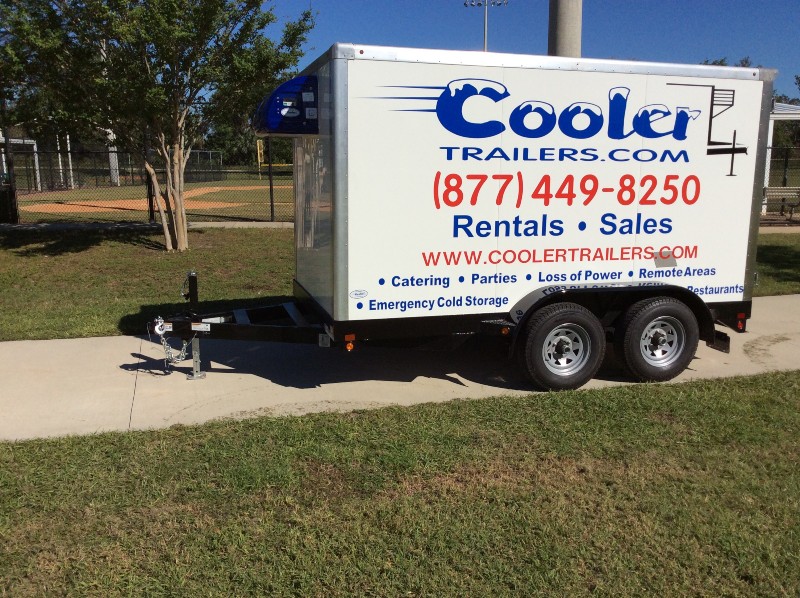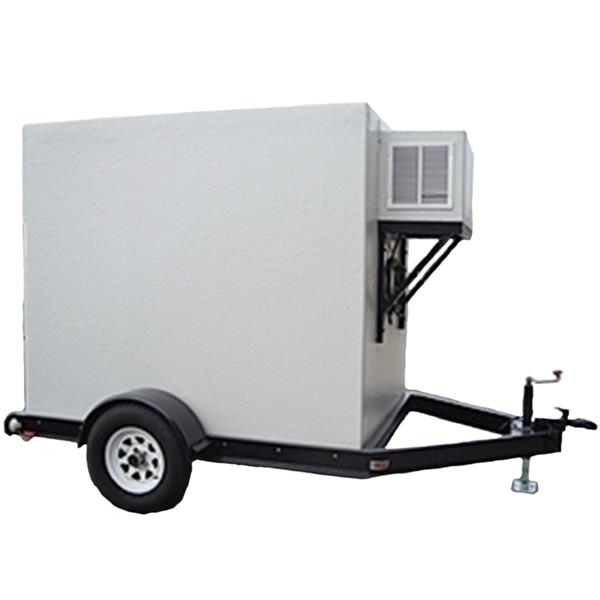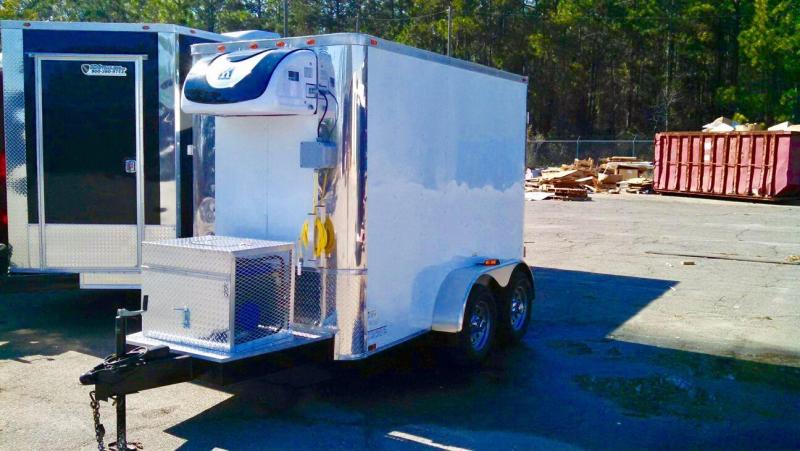Cooling Solutions on Wheels: Small Refrigerated Trailer-Cooler Trailers
Cooling Solutions on Wheels: Small Refrigerated Trailer-Cooler Trailers
Blog Article
The Ultimate Guide to Choosing the Ideal Chilled Trailers
When it comes to choosing the ideal cooled trailer for your business requirements, numerous elements need to be thoroughly thought about to ensure ideal efficiency and efficiency. From the different kinds of chilled trailers available to the crucial attributes such as size, temperature control, and power efficiency, each element plays a vital role in identifying the ideal fit for your specific requirements.
Kinds Of Refrigerated Trailers

When taking into consideration the kinds of refrigerated trailers, it is important to examine their details features and capabilities to match the transportation needs of disposable products. The 2 key kinds of chilled trailers are reefer trailers and shielded trailers. Reefer trailers, brief for chilled trailers, are equipped with cooling down systems that proactively manage the inner temperature level to keep perishable goods at the required conditions throughout transportation. These trailers are excellent for items like fresh fruit and vegetables, milk, meat, and drugs that need exact temperature control - small refrigerated trailer- cooler trailers.

Dimension Factors To Consider
Thinking about the dimensions of the refrigerated trailer is necessary to make certain ideal storage ability and effective transportation of perishable items. When choosing the size of a chilled trailer, it is important to take into account the quantity of products that need to be moved. Larger trailers offer even more storage space, making them ideal for businesses with significant shipping demands. Smaller sized trailers are a lot more maneuverable and economical for services with lesser lots or restricted storage room at their facilities.
When establishing the dimension of the chilled trailer is the measurements of the goods being transferred,One more element to think about. Some products might have certain dimension demands or require to be piled in a specific way to avoid damages. Consequently, picking a trailer dimension that suits the measurements of the items will certainly assist preserve their high quality during transit.

Temperature Control Features
Reliable management of temperature level control in chilled trailers is important for maintaining the quality and safety and security of perishable items throughout transportation. When picking a refrigerated trailer, it is necessary to consider the temperature have a peek here control includes it supplies.
Furthermore, some cooled trailers feature multi-zone temperature control abilities, permitting various compartments to preserve differing temperature levels as needed for different sorts of goods. When transferring a mix of disposable things with distinctive temperature level requirements, this function is especially beneficial. Furthermore, trailers with effective insulation and temperature level uniformity throughout the cargo area aid protect against chilly or warm places, ensuring consistent conditions for all products being moved
Power Efficiency Factors
A vital element to examine when choosing a cooled trailer is its energy effectiveness, which plays a considerable function in minimizing functional expenses and ecological effect. Energy efficiency elements to consider include the insulation quality of the trailer, the kind of refrigeration system used, and any kind of added attributes that add to minimizing power intake. Top notch insulation is vital as it assists maintain the desired temperature level inside the trailer with marginal energy loss. Modern refrigeration systems, such as those utilizing innovative modern technology like electric standby options or solar energy, can likewise enhance power effectiveness. Additionally, attributes like automated defrost cycles, temperature surveillance systems, and effective airflow layout can even more maximize power usage. By focusing on energy-efficient cooled trailers, businesses can not just save on general expenses however also minimize their carbon footprint, making a favorable contribution to sustainability initiatives in the transportation sector.
Upkeep and Solution Tips
Provided the vital duty of power effectiveness in decreasing functional expenses, it is crucial to develop a proactive maintenance and service routine for chilled trailers to make certain optimal performance and durability. Consistently inspecting and preserving the trailer's refrigeration device is crucial. This includes checking the gaskets for any type of deterioration, making certain correct insulation, and cleaning the condenser and evaporator coils. Keeping track of temperature levels and calibrating the thermostat regularly can assist stop temperature changes that may jeopardize the high quality of the carried products. Furthermore, examining the trailer's tires, brakes, lights, and electrical systems is important to ensure reputable and risk-free operation. Collaborating with a trusted company for routine upkeep checks and attending to any type of problems promptly can significantly expand the life-span of the cooled trailer. Executing a detailed upkeep routine and keeping thorough documents of all service and repair work performed can assist in determining trends, maximizing performance, and minimizing unanticipated break downs.

Conclusion
In verdict, choosing the ideal refrigerated trailer entails thinking about numerous elements such look at this now as the kind of trailer, size demands, temperature level control functions, power efficiency, and upkeep needs. By examining these aspects thoroughly, businesses can ensure they select a cooled trailer that satisfies their details needs and demands, inevitably leading to much more reliable transport and storage of temperature-sensitive goods.
The two key kinds of refrigerated trailers are reefer trailers and insulated trailers (small refrigerated see this here trailer- cooler trailers). Reefer trailers, short for cooled trailers, are outfitted with cooling systems that actively control the interior temperature level to maintain subject to spoiling goods at the required conditions during transportation.On the other hand, protected trailers are made to keep the temperature level of the goods using the insulation residential properties of the trailer wall surfaces. While they do not have energetic air conditioning systems like reefer trailers, shielded trailers are ideal for items that require defense from exterior temperature level variants yet do not call for as rigorous temperature level control as subject to spoiling items.Effective monitoring of temperature level control in cooled trailers is critical for maintaining the top quality and safety and security of disposable products during transportation
Report this page